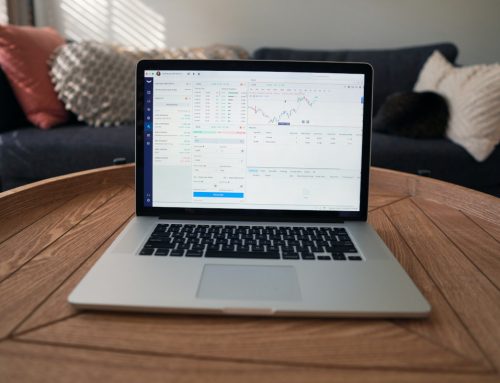What are stock options and how do they work? Whether you’re simply looking to invest in the stock market or the company you work for offered you employee stock options – gaining an understanding of stock options will help you identify good opportunities and stay away from bad ones.
Simply put, stock options give you the right – but not the obligation – to buy a stock at a predetermined price. When it comes to employee stock options there is a vesting period you must wait before exercising the option. But if you’re trading independently in the stock market, you can exercise your option at any point in time that makes sense for you. The goal is to buy stock options that appreciate beyond the strike price so you earn a profit by cashing in on your options.
As you’ll soon learn, though, options can get quite complicated. There are different types of options, different contract types, and more. There are tons of factors affecting whether you end up making a good investment or one you regret down the road.
Don’t worry – we’re going to talk about everything you need to know in this complete guide. You’ll learn what stock options are and how they work so you can take advantage in the workplace or the stock market.
Featured Courses:
What Are Stock Options and How Do They Work?
So, what are stock options and how do they work? There are two scenarios in which you’ll encounter stock options:
- When being compensated by your company
- When trading in the stock market
While there is really no difference in the definition of these options, the manner in which they work may differ slightly. We’ll cover all this and more below. Let’s start with a quick definition of what stock options are.
What Are Stock Options?
Stock options, in general, are a contract that investors can purchase on the stock market. Or, contracts that employees can buy into as a form of compensation. The contract gives you the right to buy (or in some cases, sell) a predetermined asset at a given price before or on a given date. The quantity of that asset is also predetermined. To help simplify things, let’s take a look at the different elements of an options contract:
- The given stock or commodity
- The exercise price (also known as the strike price)
- Either an expiration date or vesting period
- The number of shares (typically sold in lots – or groups of 100)
Before we go any further, let’s clarify how company stock options work from an employee compensation perspective. Then, we’ll be able to dive deeper into the world of options from the independent trader’s perspective.
Employee Stock Options
Many companies that are publicly traded will offer employees stock options as a form of compensation. This is very common in startup companies where capital for salaries may be limited. The employer will offer a modest salary along with incentive stock options to help sweeten the compensation package – along with sick days and vacations days, and other perks.
Part of the reason companies love offering incentive stock options is that it aligns employees with the company’s goals. You are incentivized to raise the value of the company’s stock. But that’s not all – it helps with employee retention, too. That’s because these options typically feature a vesting period. What does this mean for you, the employee? It means you must stick around through this vesting period before your options are actually “earned”.
The specific vesting period will vary from company to company. Maybe it’s a year, maybe it’s 10 years. It’s important to read the contract carefully to make sure it makes sense for you. If you don’t want to feel stuck in your job, don’t take the deal if the vesting period is unfavorable.
How Do Stock Options Work?
Now, that you know a little more about what these contracts are – how do stock options work? More importantly, how do you actually make money from them?
There are two scenarios: once your shares are vested (or at any point when trading these contracts independently in the stock market), you can exercise your stock option contract. You will need to have the cash on hand to buy those shares – but, then you can turn around and sell them for a profit. Or, you can continue holding the shares if you suspect they will continue to rise in value over time.
The other scenario is that you can sell your options contract rather than cashing in on it. This is a great way to earn profits. Maybe you don’t have the cash on hand to actually buy the shares of stocks at the strike price and you just want to take that profit you’ve earned by investing in that contract.
Sounds simple, right?
But, when you start to factor in the two different types of options contracts – calls and puts – things can become more complicated. Let us break it down for you below.
Calls vs Puts
You are probably more familiar with options contracts that give you the right – but not the obligation – to buy stocks at the exercise price. This is known as a call option. However, there are also contracts that give the buyer (you) the right – but not the obligation – to sell a stock at the exercise price. These are known as put options.
Both calls and puts can be very lucrative. To help you gain a better understanding of these two varying contract styles let’s look at some examples of how they can play out. Say you purchase a call option for 1 lot of company XYZ’s shares at an exercise price of $10 a share. The contract expires in 1 year (or if you’re talking employee stock options, let’s say there is a 1 year vesting period). That contract is worth $1,000 at the time of purchase. But 1 year from now when it’s time to make a decision and either exercise the call or sell the contract, the stock price has risen to $15 a share. The contract is now worth $1,500. You can exercise your option and buy that stock at a discount essentially. Or, you can sell the contract and take the $500 profit right away.
Now, what would a put contract look like? Let’s take the same exact example. But this time, you’re buying a put contract on a company you expect to drop in value before the expiration date. Say after a year, the company dropped from $10 a share to $8 a share. You can then sell the stock at a premium – since your exercise price is $10, earning a profit of $200.
As you can see, both calls and puts can be very lucrative – especially if you have industry-specific information and do a great job with fundamental analysis.
How Do You Actually Trade Stock Options?
When it comes to employee stock options, your company will walk you through the whole process. But as an independent trader, how do you go about trading stock options? Where can you buy and sell these contracts?
You can trade these contracts in most investing platforms and brokerage sites – just as you would individual stocks. And if you’re a complete beginner you can get started very easily – as contracts start very cheap, as low as $.50 per contract depending on trading volume.
The Negative Side Of Options Contracts
Whether your stock option contract is through your employer or through an independent broker, it’s important to stay mindful that these contracts don’t always go your way. Even if you work for a quality company that you expect to rise in value – even if you conduct sound fundamental analysis – sometimes you’ll end up out of the money on your contract.
As an employee, this is why you should view options contracts as an investment – and make sure the rest of your compensation package accounts for this. As an investor, that’s why you should always hedge your bets and stay up to date on your investments so you can exercise your options when it makes sense – or sell off the contract before incurring heavier losses.
What Are Stock Options and How Do They Work? Wrapping Up
In this guide, we’ve taught you all you need to know to get started with options contracts: whether you’re an employee or a trader. You’ve learned:
- What are stock options?
- How do stock options work?
- Calls vs Puts
If you want to learn more about how options trading compares to other styles, check out our guide on swing trading options. We also wrote a guide on how stock options are taxed – an important resource for those who are considering taking stock options from their employer.
Ready to start trading options in confidence? With a stock forecasting website, you can gain insights into market trends and time your contracts to perfection. VectorVest presents investors with a clear buy, sell, or hold recommendation for any given stock – so you can get a sense of how your contract currently stands. This will help you determine whether you should exercise your contract and take profits, cut losses, or see things through. The software will also help you find winning opportunities on autopilot. Try it risk-free for 30 days and see what the hype is all about for yourself!
Featured Courses:
What you should do next…
- Get our latest blogs delivered right to your inbox, subscribe to our newsletter.
- The market moves fast! Get our most current evaluation of this stock with our FREE stock analysis tool.
- Looking for stock picks? Not sure if now is the right time to buy/sell? For a limited time, enjoy the full benefits of a 30-day subscription to VectorVest for only $9.95 (usually up to $139/month) . Get access to our full list of screeners showcasing our top stock picks that tell you exactly what to buy, when to buy, and when to sell.









Leave A Comment